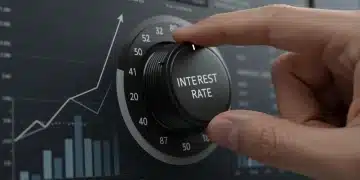Credit score increase hacks that really work

Anúncios
Credit score increase hacks include paying bills on time, reducing credit utilization, checking credit reports for errors, and knowing when to seek professional help to effectively boost your credit score.
If you’ve ever wondered how to improve your credit rating, you’re not alone. Boosting your score can open doors to better loans and rates. Here are some credit score increase hacks that might just do the trick!
Anúncios
Understanding credit scores
Understanding credit scores is crucial for anyone looking to improve their financial health. A credit score is a three-digit number that reflects your creditworthiness. It ranges from 300 to 850, where higher scores indicate better credit. But what exactly influences these numbers?
Key Factors Affecting Credit Scores
Several factors contribute to your credit score. These include your payment history, credit utilization, and length of credit history. Each component has a unique impact on your overall score.
Anúncios
- Payment history: This is the most significant factor, accounting for about 35% of your score. Consistent, on-time payments enhance your score.
- Credit utilization: This measures how much of your available credit you’re using. It’s best to keep this below 30% to maintain a healthy score.
- Length of credit history: The longer your credit history, the better. A well-established credit history shows lenders you manage credit responsibly.
Other factors like types of credit and recent inquiries also play a role. It’s vital to remember that understanding these elements helps you make informed decisions about managing your credit.
The Importance of Checking Your Credit Score
Regularly checking your credit score allows you to understand where you stand. It also helps catch any inaccuracies that could harm your score. Monitoring your score can provide insights into how your financial decisions affect your rating. If you notice a dip, you can quickly take action to correct it.
Additionally, some services offer free credit score checks, making it easier for you to stay on top of your finances. Knowing your score empowers you and helps you make smarter borrowing decisions.
In summary, grasping the fundamentals of credit scores is vital. By understanding what affects your score, you can actively work towards improving it and enhancing your financial opportunities.
Top hacks to boost your credit score

Boosting your credit score doesn’t have to be complicated. There are several effective strategies you can implement today to see improvements. Understanding these hacks can lead to better financial opportunities and lower interest rates.
Pay Your Bills on Time
One of the simplest and most effective ways to increase your credit score is to pay your bills on time. This habit reflects well on your credit report and makes up a significant part of your score. Late payments can lead to drops in your rating, so setting up reminders or automatic payments can be beneficial.
Reduce Your Credit Utilization
Your credit utilization is the amount of credit you are using compared to your total available credit. Keeping this under 30% is ideal. If you can, try to pay down existing balances or request an increase in your credit limit. This can improve your score without increasing your spending.
- Pay off high-interest debts first.
- Consider consolidating debt to lower overall payments.
- Make multiple payments within a month to keep your balance low.
Monitor Your Credit Report
Regularly checking your credit report is crucial. It allows you to spot any inaccuracies that could be dragging your score down. If you find errors, promptly report them to improve your rating. There are many free services out there that can help you monitor your score easily.
Limit New Credit Inquiries
Every time you apply for new credit, a hard inquiry is recorded on your report. While a few inquiries won’t hurt significantly, too many in a short time can negatively impact your score. Be selective about when you apply for new credit and consider waiting before making additional applications.
By incorporating these hacks into your financial routine, you’ll be on your way to a healthier credit score. Remember, improving your credit takes time and consistency, but the benefits will be worth the effort.
Common mistakes that hurt your credit
Understanding the common mistakes that can hurt your credit is essential for anyone looking to improve their financial standing. Even small errors in managing your credit can have significant impacts on your credit score.
Missing Payments
One of the biggest mistakes people make is missing payment due dates. Late payments can stay on your credit report for up to seven years, negatively impacting your score. Setting reminders or automatic payments can help you stay on track.
Applying for Too Much Credit
When you apply for multiple credit cards or loans within a short period, it creates several hard inquiries on your credit report. This can signal to lenders that you are a risk. It’s best to space out your credit applications and focus on only what you need.
- Limit credit applications to avoid multiple hard inquiries.
- Space out new accounts to maintain a steady credit history.
- Research options before applying to choose wisely.
High Credit Utilization
Keeping your credit utilization ratio high can lower your credit score. This ratio represents how much of your available credit you are using. Aim to keep it below 30%. Paying down your balances and regularly monitoring your spending can help maintain a healthy level.
Ignoring Credit Reports
Many people forget to check their credit reports for errors. Mistakes can occur, such as incorrect information or accounts that do not belong to you. Regularly reviewing your reports ensures accuracy and can help you catch errors before they harm your score.
Being aware of these common mistakes can significantly enhance your journey to better credit. Identifying and correcting these issues will pave the way for a healthier financial future.
How long do hacks take to show results?

When implementing credit score increase hacks, one common question arises: how long do these strategies take to show results? The answer can vary based on several factors, including the specific hacks employed and an individual’s credit situation.
Immediate Changes
Some actions can yield quick results. For instance, paying down high credit card balances may promptly lower your credit utilization ratio, which can positively impact your score almost immediately. Moreover, setting up on-time payments can quickly reflect favorably on your payment history.
Short-term Strategies
Other methods, like disputing inaccuracies on your credit report, may take a bit longer. Once you file a dispute, credit bureaus generally have 30 days to respond. If an error is corrected, you could see improvements to your score shortly after.
- Paying bills on time can reflect in 30 days.
- Disputing errors takes about 30 days for a response.
- Clearing high balances may show improvement within a month.
Long-term Benefits
Some hacks, however, focus on long-term financial habits. Maintaining consistent on-time payments and keeping credit utilization low will gradually build a stronger credit history. Over time, these strategies can lead to significant improvements in your credit score, but they require patience and consistency.
In general, most credit score improvements can start to be visible within one to three months, depending on the hacks applied and how aggressively you implement them. Focus on developing healthy credit habits to ensure ongoing improvement.
When to seek professional help
Knowing when to seek professional help with your credit can be a game changer. Not everyone needs to hire an expert, but specific situations might call for it. Understanding these can save you time and stress.
When Your Credit Score Is Stagnant
If you have been working on improving your credit and see no progress after several months, it may be time to consult a professional. They can provide tailored strategies to break through any barriers.
Multiple Negative Items on Your Report
Having numerous negative items on your credit report can feel overwhelming. Professionals can identify patterns and help you develop a plan to address these issues effectively. They often have resources and tools that can speed up the process of improving your score.
- Credit counseling services can help manage debt.
- Credit repair companies can negotiate with creditors on your behalf.
- Financial advisors can provide guidance on your overall financial health.
Contemplating Major Financial Decisions
If you’re considering significant financial moves like buying a house or a car, getting help can be wise. A professional can assist in preparing your credit for these purchases, ensuring you’re in the best position to secure favorable loan terms.
Feeling Overwhelmed by Debt
Should your debt feel unmanageable, it’s essential to seek help. Professionals can guide restructuring loans, creating payment plans, or even negotiating with creditors to reduce debt, relieving financial pressure.
Ultimately, knowing when to seek professional help can make a substantial difference in your credit journey. Evaluating your circumstances and understanding your financial goals can lead to the best decision for your credit health.
FAQ – Frequently Asked Questions about Increasing Your Credit Score
What is a credit score?
A credit score is a three-digit number that represents your creditworthiness, used by lenders to evaluate the risk of lending you money.
How can I improve my credit score?
You can improve your score by paying bills on time, reducing credit utilization, checking your credit report for errors, and practicing good credit habits.
How long does it take to see improvements in my credit score?
Typically, you may start to see improvements in your credit score within one to three months after making positive changes.
When should I seek professional help for my credit issues?
Consider seeking professional help if you’re feeling overwhelmed by debt, if your credit score is stagnant, or if you have multiple negative items on your credit report.





